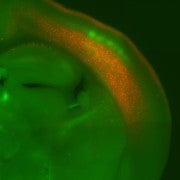Research
During development, environmental factors can affect the penetrance of genetic susceptibility to neuropsychiatric disease. Indeed, sensory experience and molecular programs have been shown to synergistically regulate neuronal maturation.

Neurons in the neocortex receive activity through long range presynaptic inputs that communicate information from the environment. In particular, sensory inputs to cortical sensory areas regulate the excitatory/inhibitory balance during development. However, excitatory and inhibitory neurons appear to be differentially affected by external cues. What is the role of input-specific developmental activity and what are the downstream molecular effectors in distinct cell-types? In addition, as development progresses, not only sensory activity, but other early postnatal environmental cues or stress are conveyed to the neocortex. Do these modulators shape neural circuits and how?
The Pouchelon lab aims to study the interplay between sensory and neuromodulatory inputs and genetic programs of circuit maturation, using combinatorial approaches from electrophysiology to single cell transcriptomics combined with CRISPR strategies, mouse genetics and viral cell-type targeting. Moreover, we are interested in parsing out the origin of the various dysfunctions in neurodevelopmental disorders.



